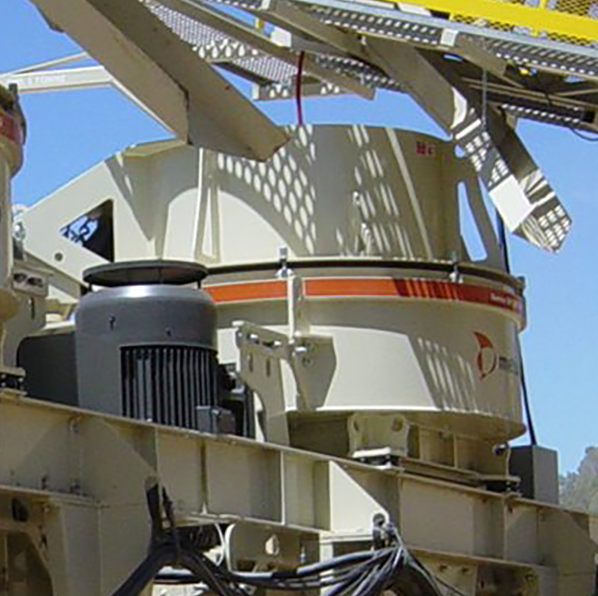Understanding how vertical shaft impact (VSI) crushers work is essential for anyone looking to operate or maintain this equipment. Vertical shaft impact crusher is one of the most effective and efficient pieces of crushing equipment, used in a wide variety of industries. Knowing how these machines work helps operators understand their limitations and maximize their efficiency.
Understanding the mechanisms behind vertical shaft impact crushers allows technicians to troubleshoot any problems that may arise with them more quickly and effectively.
What Are Vertical Shaft Impact Crushers?
Vertical shaft impact crushers are a type of rock-crushing equipment that uses either metal anvils or crushed rock to break down rocks and other materials into smaller pieces. They are commonly used in the mining industry and in construction projects to reduce the size of large rocks.
VSI crushers use centrifugal force created by spinning rotors with two or more impeller blades, which cause the material being processed to be broken down into much smaller particles. The end product is usually gravel, sand, or powder depending on what kind of material is being processed. With their versatility and efficiency, VSI crushers have become invaluable tools for many industries.
The main features of VSI crushers include:
- High efficiency and low operating cost
- Easy maintenance and operation
- Versatile applications with a wide range of materials
- Increased production capacity to meet customer demands quickly
- Improved product quality for better customer satisfaction
How Vertical Shaft Impact Crushers Work
A VSI crusher works with both soft and hard materials.The material is then deflected from its original path, impacting other particles, and breaking them into smaller pieces. This process of repeated impact and reimpact results in a much finer product than traditional crushing methods, such as jaw and cone crushers.
VSI crushers are typically used for rocks, ores, minerals, metals, and other materials capable of being crushed or pulverized. They employ two different types of crushing machines: autogenous and semi-autogenous.
In autogenous crushing, anvils or rock shelves are used to crush the material against itself. Semi-autogenous crushing uses both anvils and rock shelves to achieve greater size reduction with a higher speed than traditional jaw crushers.
The VSI crusher works by accelerating the feed material to such a high speed that it causes extreme pressures within the crushing chamber which force the particles apart from each other. This creates tiny cracks in the material’s surface which increase with successive passes through the machine until they become too small to further fracture into separate pieces.
The VSI crusher is an extremely versatile machine that offers a variety of applications including:
- Asphalt recycling
- Aggregate production
- Glass recycling
- Steel slag treatment
- Cement production
With its ability to produce various particle sizes, ranging from 1 mm up to micron size, VSI crushers can satisfy multiple applications depending on the desired output specifications. This makes it an essential tool for most industries today.
VSI Crusher Applications
The primary application of VSI crushers is in the size reduction process for materials like aggregates and concrete. VSI crushers can also be used to produce manufactured sand from natural rock and minerals. This form of crushed aggregate has superior properties due to its angular shape which results from the accelerated speed at which it enters the chamber. Using a VSI crusher is often much more economical than traditional forms of sand preparation.
In addition, VSI crushers offer additional advantages such as increased production capacity with improved quality control, less need for rock screening equipment, and improved product consistency for more demanding fine-grained aggregate applications.
VSI crushers can be used to crush a wide variety of hard rocks, such as granite, limestone, basalt, and quartzite. When compared to conventional crushing techniques, VSI offers higher energy efficiency, lower operating costs, and reduced particle shape discrepancies when processing extremely hard or abrasive materials. This makes them particularly attractive for applications like road building or quarrying where the material often needs to be presented in an extremely precise shape.
VSI crushers are also widely employed in mineral ore grinding plants such as gold ore dressing plants or copper ore beneficiation plants allowing for finer outputs when compared with standard rod mills or ball mills used in mineral processing circuits.
Utilizing VSI Crushers to Their Full Capacity With Mellott
VSI crushers are an essential component of many industrial processes, providing a powerful and efficient means to crush materials. By utilizing the principles of rock-on-rock crushing, they effectively reduce material size while producing minimal dust pollution and creating desirable grain shapes. To learn more about how you can use vertical shaft impact crushers to help you with your next project, reach out to the Mellott team of experts today at 855-554-1606.

